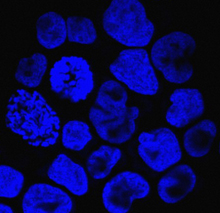BACH2 Helps Orchestrate the Immune Response
BACH2 Helps Orchestrate the Immune Response
Scientists discovered how a gene called BACH2 may affect the development of multiple sclerosis, asthma, Crohn’s disease, celiac disease and other allergic and autoimmune diseases.

Human T cells stained to reveal the DNA in their nuclei. Image by A. Walker, L. Sharp & J. Pryde./ All rights reserved by Wellcome Images.
The immune system has a variety of cell types that act in unison to protect the body from invading microbial threats. Autoimmune diseases—which include type 1 diabetes, psoriasis and multiple sclerosis—arise when this system mistakenly attacks the body’s own tissues. Autoimmunity can also occur in infectious diseases and cancer.
How all the parts of the immune system keep in balance still isn’t well understood. White blood cells called CD4 T cells play a dual role. As these cells mature, they can become one of many types of T cell, each of which has a distinct function. Some CD4 cells activate immune responses. Others, called regulatory T cells, constrain immune responses. When the immune system is out of balance, uncontrolled reactions can lead to attacks against the body’s own cells and tissues. Immune responses cause tissue inflammation, and when immune reactions are uncontrolled, the excessive inflammation can result in tissue and organ damage and may even be lethal.
Previous studies found that people with diverse autoimmune diseases and allergies (in which the immune system attacks a harmless substance such as pollen) often have minor variations in the gene coding for BACH2. BACH2 is a transcription factor, a protein that regulates the activity of genes. A team headed by researchers at NIH’s National Cancer Institute (NCI) and National Institute of Arthritis and Musculoskeletal and Skin Diseases (NIAMS) set out to further investigate the role of BACH2 in autoimmune diseases. Their study appeared online in Nature on June 2, 2013.
When the scientists disrupted the gene for BACH2 in mice, the animals appeared normal at birth but died of autoimmune diseases within months. Using genome-wide approaches, the team found that BACH2 has a broad role in regulating immune function. The protein directly binds hundreds of genes in maturing T cells and affects the activity of thousands of genes.
Further experiments showed that BACH2 activity influences whether maturing T cells become inflammatory or regulatory. BACH2 proved essential for the formation of regulatory T cells. It thus plays a major role in suppressing lethal inflammation.
“Although genes have been found that play specific roles in either inflammatory cells or regulatory cells, BACH2 regulates the choice between the 2 cell types, resulting in its critical role in maintaining the immune system’s healthy balance,” says Dr. Nicholas P. Restifo, one of the study’s leaders. “It’s apt that the gene shares its name with the famous composer Bach, since it orchestrates many components of the immune response, which, like the diverse instruments of an orchestra, must act in unison to achieve symphonic harmony.”
The role of BACH2 in humans still needs to be confirmed. However, these findings may be the first step in developing novel therapies for allergic and autoimmune diseases. The findings may have implications for cancer as well, since cancers can co-opt regulatory T cells to prevent their own destruction.
###
* The above story is reprinted from materials provided by National Institutes of Health (NIH)
** The National Institutes of Health (NIH) , a part of the U.S. Department of Health and Human Services, is the nation’s medical research agency—making important discoveries that improve health and save lives. The National Institutes of Health is made up of 27 different components called Institutes and Centers. Each has its own specific research agenda. All but three of these components receive their funding directly from Congress, and administrate their own budgets.




















